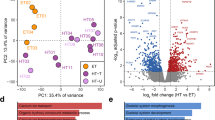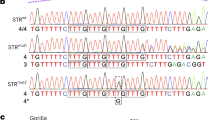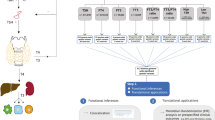Abstract
Familial non-autoimmune hyperthyroidism is a rare autosomal dominant genetic disease resulting from activating mutations in the thyroid-stimulating hormone receptor (TSHR) gene. In this work a Chinese family with autosomal dominant non-autoimmune hyperthyroidism across four generations was collected. The strongest evidence for linkage in this study occurred on chromosome 14q24.2–31.3. By mutation scan of the TSHR gene located within the region of interest, a heterozygote substitution (A > T) at position 2071 of the TSHR was found, changing isoleucine 691 to phenylalanine. Our study identified the first germline mutation in the intracellular C-terminal domain of TSHR.
Similar content being viewed by others
Log in or create a free account to read this content
Gain free access to this article, as well as selected content from this journal and more on nature.com
or
References
de Roux N, Misrahi M, Chatelain N, Gross B, Milgrom E (1996) Microsatellites and PCR primers for genetic studies and genomic sequencing of the human TSH receptor gene. Mol Cell Endocrinol 117:253–256
Duprez L, Parma J, Van Sande J, Allgeier A, Leclere J, Schvartz C, Delisle MJ, Decoulx M, Orgiazzi J, Dumont J (1994) Germline mutations in the thyrotropin receptor gene cause non-autoimmune autosomal dominant hyperthyroidism. Nat Genet 7:396–401
Farid NR, Kascur V, Balazs C (2000) The human thyrotropin receptor is highly mutable: a review of gain-of-function mutations. Eur J Endocrinol 143:25–30
Grasberger H, Van Sande J, Hag-Dahood Mahameed A, Tenenbaum-Rakover Y, Refetoff S (2007) A familial thyrotropin (TSH) receptor mutation provides in vivo evidence that the inositol phosphates/Ca2+ cascade mediates TSH action on thyroid hormone synthesis. J Clin Endocrinol Metab 92:2816–2820
Neumann S, Claus M, Paschke R (2005) Interactions between the extracellular domain and the extracellular loops as well as the 6th transmembrane domain is necessary for TSH receptor activation. Eur J Endocrinol 152:625–634
Nishi S, Hsu SY, Zell K, Hsueh AJ (2000) Characterization of two fly LGR (leucine-rich repeat-containing, G protein-coupled receptor) proteins homologous to vertebrate glycoprotein hormone receptors: constitutive activation of wild-type flies LGR1 but not LGR2 in transfected mammalian cells. Endocrinology 141:4081–4090
Park SM, Chatterjee VK (2005) Genetics of congenital hypothyroidism. J Med Genet 42:379–389
Parma J, Duprez L, Van Sande J, Cochaux P, Gervy C, Mockel J, Dumont J, Vassart G (1993) Somatic mutations in the thyrotropin receptor gene cause hyperfunctioning thyroid adenomas. Nature 365:649–651
Smits G, Govaerts C, Nubourgh I, Pardo L, Vassart G, Costagliola S (2002) Lysine 183 and glutamic acid 157 of the TSH receptor: two interacting residues with a key role in determining specificity toward TSH and human CG. Mol Endocrinol 16:722–735
Van Sande J, Parma J, Tonacchera M, Swillens S, Dumont J, Vassart G (1995) Somatic and germline mutations of the TSH receptor gene in thyroid diseases. J Clin Endocrinol Metab 80:2577–2585
Yang Y, Guo J, Liu Z, Tang S, Li N, Yang M, Pang Q, Fan F, Bu J, Yuan ST, Xiao X, Chen Y, Zhao K (2006) A locus for autosomal dominant accessory auricular anomaly maps to 14q11.2–q12. Hum Genet 120:144–147
Acknowledgments
We would like to thank the family who participated in this study. This work was supported by a Grant from the National Nature Science Foundation of China (No. 30400240).
Author information
Authors and Affiliations
Corresponding author
Additional information
Zheng Liu and Yuanming Sun contribute to this work equally.
Rights and permissions
About this article
Cite this article
Liu, Z., Sun, Y., Dong, Q. et al. A novel TSHR gene mutation (Ile691Phe) in a Chinese family causing autosomal dominant non-autoimmune hyperthyroidism. J Hum Genet 53, 475–478 (2008). https://doi.org/10.1007/s10038-008-0257-3
Received:
Accepted:
Published:
Issue date:
DOI: https://doi.org/10.1007/s10038-008-0257-3
Keywords
This article is cited by
-
Lack of consistent association of thyrotropin receptor mutations in vitro activity with the clinical course of patients with sporadic non-autoimmune hyperthyroidism
Journal of Endocrinological Investigation (2010)
-
Detection of combined genomic variants in a Jordanian family with familial non-autoimmune hyperthyroidism
Journal of Genetics (2009)



